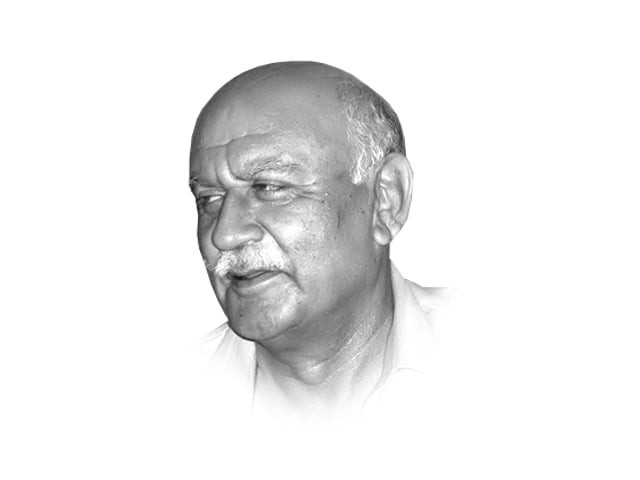The Charsadda tragedy was waiting to happen
With the attack in Charsadda, once again people are saying that this is a failure of intelligence and security forces

The writer is a retired brigadier and a former president of the Islamabad Policy Research Institute
With the attack in Charsadda, once again people are saying that this is a failure of intelligence and security forces. It isn’t. It is neither an intelligence failure, nor a failure of the security forces.
If we deploy every single soldier of every single security establishment to defend every conceivable target, there would still be targets that terrorists could attack successfully. Let me go further, if the entire nation was armed and were to be deployed to defend itself, we would still be vulnerable.
An APS or Charsadda could still occur at regular intervals.
That ‘offence is the best method of defence’ is drilled into every soldier’s mind throughout his career. Some theorists go so far as to say that ‘offence is the only method of defence’, but that I disagree with.
In my view the sole, yes, the sole purpose of any defensive manoeuvre is to create conditions for the offensive manoeuvre that must follow. And this truism is universally applicable.
The rationale is simple. No defensive manoeuvre ever won a war. It can win battles; never the war. The reason is also simple. Defence, by definition, is passive and reactive while offence is active. Consequently, all initiative rests with the offender.
All defending forces try to be active, and that is the point: they try. That is why every defensive manoeuvre must be conceived as a prelude to an offence.
And let us be very clear; increased security is a defensive measure.
And terrorism is, by nature an offensive mechanism. Even as we take all necessary measures, we can only defeat terrorists by our offensive and, as long as the war is ongoing, we must be prepared that, every once in a while, the terrorist will succeed.
While every single such attack can be dubbed an intelligence failure, it would be unfair to do so. No intelligence agency, however well organised, trained or equipped, can possibly have knowledge of everything that terrorists are planning.
The most well protected political leader is supposed to be the president of the United States. And yet, how many have died in office, as well as those being attacked and wounded? Furthermore, I have explained at every opportunity that successes of intelligence organisations are seldom known but failures are invariably public knowledge. This is precisely why their limitations must be understood.
Gaining intelligence of a conventional enemy’s forces and dispositions is far easier than the uncovering of plans of terrorists.
Even the infiltration of enemy forces is easier. I pointed out in earlier articles that infiltrating a terrorist organisation and winning their trust would necessarily entail carrying out terrorist attacks against our own citizens. Only then could the infiltrator win the trust of terrorists. When British forces decided to infiltrate the IRA, it took them almost five years.
So, let’s go easy on the blame game and stop looking for scapegoats.
On this occasion, I sensed a more defensive approach from the response of the authorities. It is enough to inform the public that the attack was being controlled from Afghanistan, and that we are not accusing the Afghanistan government. There was no need to parade those captured before the media.
However, that is by no means intended to say that there is no room for improvement. Foremost, the National Action Plan needs to be implemented in letter and spirit. We need more vigilant and better trained security personnel, individuals who are trained to look for the unusual and the suspicious, and to act on it, without waiting for orders.
We need small groups of Rapid Deployment Forces, RDF, strategically located to react swiftly and surely. We need them to be accessible on hotlines to members of the public. And we need a public awareness programme in the media which makes the public aware and tells it what concerned citizens can do and, more importantly, what they must not do.
We need to expand the role of the Citizens-Police Liaison Committees. But then, these citizens must also be carefully selected and trained. If they consist of alarmists, the RDF will be running in circles endlessly and will never be where it should.
What should we, ordinary citizens, do?
I repeat myself when I say there is no room for vigilantism here. It will merely create chaos and add to the problems of security personnel.
All sensible citizens need to take the trouble to educate themselves and be on the lookout for anything suspicious. If you spot something suspicious, don’t alert the person whose actions alerted you by word, deed or reaction. Merely call the RDF or alert-nominated personnel.
Most of all, be more understanding of those deployed to provide security to us all. Not only those manning checkposts who hold up traffic, and are frequently castigated by commuters — sometimes under their breaths — but even the ordinary traffic policeman who assists us past crossings and traffic jams.
They are all there to assist us and make our lives more secure.
Published in The Express Tribune, February 4th, 2016.
Like Opinion & Editorial on Facebook, follow @ETOpEd on Twitter to receive all updates on all our daily pieces.















COMMENTS
Comments are moderated and generally will be posted if they are on-topic and not abusive.
For more information, please see our Comments FAQ